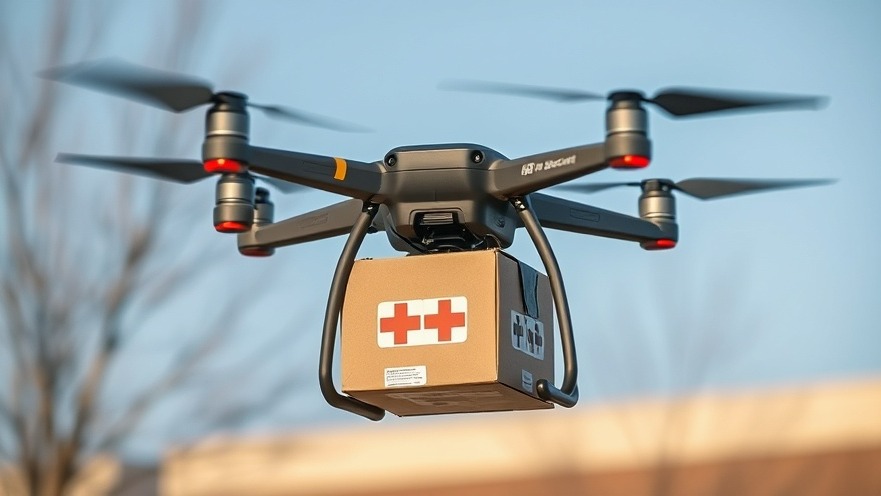
Transforming Health Access: The Drone Delivery Revolution in Appalachia
In the rugged terrain of Appalachia, obstacles like distance and geography have historically hampered access to essential health resources, particularly for vulnerable populations. A recent pilot study highlights a promising solution: drone-based delivery systems that could revolutionize healthcare access in these underserved regions. The collaborative effort led by the University of Kentucky's Center of Excellence in Rural Health (CERH) implemented drones to deliver critical personal protective equipment (PPE) to high-risk clients in Eastern Kentucky, addressing urgent health care needs amid the COVID-19 pandemic.
Innovative Solutions for Rural Challenges
The study, titled "Exploratory Pilot Study Engages Community Health Workers to Test Drone-Based Package Delivery System for Personal Protective Equipment in High-Risk Appalachia Population," emphasizes how innovative healthcare delivery can effectively address rural challenges. The pilot utilized community health workers (CHWs) to coordinate the drone deliveries and recruit participants from local communities, establishing a system that proves both efficient and effective. This initiative demonstrated a robust framework for implementing drone technology as a response mechanism, especially during emergencies when traditional delivery methods falter.
Benefits of Drone Delivery: A Case Study in Action
During the study, a staggering 80% of participants expressed extreme satisfaction with the drone delivery experience. They noted the simplicity of scheduling and receiving their orders, marking a significant willingness to embrace drone technology for future deliveries. Not only did the study serve to deliver PPE, but it also provided invaluable data on the effectiveness of unmanned aerial systems as tools for emergency response and public health logistics. This data could pave the way for further explorations into various applications of drone technology in healthcare settings.
Aligning Technology with Community Trust
One of the main takeaways from the exploratory study is the vital role of established trust within communities. CHWs, who enjoy extensive rapport with the populations they serve, effectively facilitated the project. This successful partnership between technology experts and local health advocates underscores the importance of community relationship-building in executing health interventions. A noteworthy comment from Fran Feltner, D.N.P., former CERH director, asserts that the study proves the solution developed might hold transformative potential for future health initiatives aimed at building capacity for environmental health in Appalachia, including novel interventions that harness drone technology.
Looking to the Future: Opportunities for New Technology
The implications of this study extend beyond PPE delivery. Future programming might leverage drones for a multitude of health resources, such as medications and health supplies, fostering better healthcare outcomes in isolated regions. The U.S. Drone Port is actively pursuing permission from the Federal Aviation Administration (FAA) to operate drones beyond the visual line of sight, which would vastly improve accessibility and service delivery for rural populations. Such advancements signify a hopeful future for healthcare in Appalachia, illustrating how drone technology can aid in bridging the healthcare access gap.
Lessons from Other Programs: Drone Technology on the Rise
This pilot study aligns with broader trends observed in healthcare delivery innovations. For example, the Health Wagon in southwest Virginia has successfully employed mobile clinics to reach uninsured and low-income populations, showcasing similar concepts to address healthcare gaps. Innovations like drone delivery not only enhance service efficiency but also emphasize the growing need for adaptability in healthcare systems that face geographical and socio-economic constraints. The precedent set by both initiatives reinforces the transformative power of technology in advancing public health.
Conclusion: Embracing Change in Healthcare Delivery
As the landscape of healthcare continues to evolve, it is vital for practitioners, particularly concierge health providers, to remain informed and innovative. Drone technology offers a significant opportunity for improving access to critical health services in rural areas like Appalachia, highlighting how technology can enhance traditional healthcare practices. The successful preliminary study invites health practitioners to rethink strategies for resource delivery, advocating for broader application in the quest for equitable healthcare.
Take Action: Now is the time to explore how drone technology could be integrated into your practice. Consider reaching out to local health initiatives or technology partners to stay ahead in the evolving healthcare environment.
 Add Row
Add Row  Add
Add 






Write A Comment